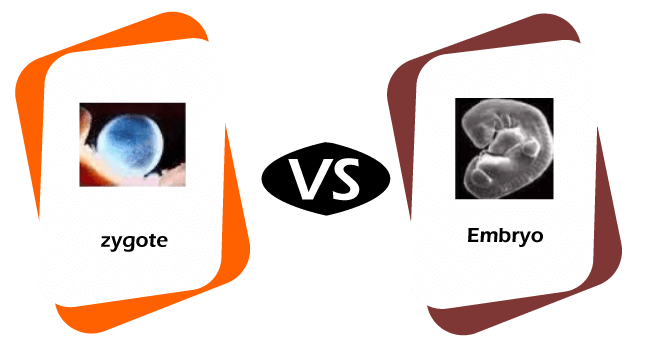Difference between Zygote and EmbryoThe human body comprises of many things like systems, arteries, cells, veins, capillaries, skin layers, etc. All these internal organs come together and form the human body. Various processes take place in the body through these complex mechanisms. The process of digestion, secreting enzymes, and reproductions; all of it takes place through the internal organs. Now, talking about reproduction, the human body faces many complications. Earlier, we had talked about the embryo and fetus. And today, we are going to talk about the zygote and embryo. Zygote and embryo are the stages of human reproduction, or we can say that they are the diploid cells that undertake reproduction. There are some differences between them too, but let us first look at the meaning of zygote and embryo. 
ZygoteA zygote is defined as the fusion of two gametes. A zygote is a eukaryotic cell formed by the process of fertilization. A zygote is considered to be an early development stage in all multi-cellular organisms. In layman's language, the union of male gamete and female gamete leads to the formation of a zygote. It further leads to the formation of an embryo. A zygote is a single cell that gets segregated into smaller cells because it is a brief stage. This stage occurs in the first week of the fertilization process. The other name of the zygote is the fertilized ovum/ egg. Now, you must be wondering as to how many days are required for a zygote to form? Well, the zygote takes around 3-6 days to enter the uterus from the fallopian tube. The cell division takes place in the uterus, which further leads to the formation of the blastocyst (hollow ball of cells). The division of the zygote takes place based on time. For instance, after 12 hours of conception, the zygote gets divided into two cells. Further, after 15 hours, the zygote gets divided into four cells. After three days, the cell count reaches sixteen. The zygote is a germinal stage (developmental stage). After this germinal stage is over, the embryonic stage starts as the zygote enters the uterine wall. After the eighth week, it becomes a multi-cellular organism called the embryo. Interestingly, the embryo becomes a fetus in the eighth or ninth stage, respectively. EmbryoAn embryo is defined as the unborn offspring that is in the process of development. An embryo has been derived from the Greek word 'embruon,' meaning embryo/ fetus. An embryo is a developmental stage that comes after the formation of a zygote. The embryo in humans is defined as the unborn offspring until the end of the seventh week. This week is followed by conception, and the embryo turns into a fetus in the eighth week. These are the first two stages of human development (zygote & embryo). In animals, the embryo is defined as a developmental stage in which the unborn offspring hatches from the egg. The fertilized egg leads to cell division and is called a pre-embryo. An embryo goes to several stages in the fertilization process. For instance, the first stage is that of a zygote, which further develops into a blastocyst. After this, an embryo is formed, leading to the formation of the fetus. The age of an embryo ranges from ten weeks to 13 weeks. After the thirteenth week, a hair called lanugo develops on the head of the embryo. Now, there are certain contrasting points between a zygote and an embryo. So, let us have a look at them.
So, these are some contrasting points regarding zygote and embryo. It is essential to note that both zygote and embryo are the processes through which a fetus is formed. The development of the fetus takes place during the ninth week. Organs like fingers, nails, head, legs, etc., grow during this week. Thus, zygote and embryo are the developmental stages occurring in the human body after conception.
Next TopicDifference between
|
 For Videos Join Our Youtube Channel: Join Now
For Videos Join Our Youtube Channel: Join Now
Feedback
- Send your Feedback to [email protected]
Help Others, Please Share










